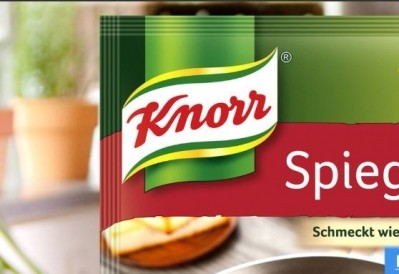‘Growth is our number one priority’: Unilever’s new CEO on the need to move beyond the ‘mass market’ model

Announcing the company’s full year results last week (31 January), Jope said that Unilever anticipates 2019 underlying sales growth to fall in the “lower end” of its long-term target of 3-5%.
“In 2019 we expect market conditions to remain challenging,” he said flagging hyperinflation in Argentina and an overall slowdown in emerging markets in Asia and Latin America.
“We think that Unilever's management became more cautious for 2019's organic sales growth due to a continuously challenging environment in China with Unilever's past high-growth product Blueair; continued volume contraction in Argentina, where Unilever has started to account for hyperinflation, where pricing is excluded but volumes are included, and continued slower growth in Brazil,” observed consumer goods analyst and CEO at of MainFirst Schweiz Alain Oberhuber.
Oberhuber said he was “negatively surprised” by the guidance, cutting MainFirst’s organic sales forecast to 3.2%, down from 4.3%.
Updating Unilever’s mass market model
Although Jope may have disappointed the market with his conservative growth expectations, he nevertheless insisted he is calling out growth – internally and externally – as the “number one priority” because “that is where the uncertainty is”.
In fiscal 2018, Univeler reported:
Underlying sales growth of 2.9% (or 3.1% ex. the divested spreads unit)
Underlying operating margin of 18.4%, up 90 basis points year-on-year
Net profit of €9.8bn, up 51.2% boosted by the proceeds from the sale of the spreads brands
“Markets are extremely dynamic,” he observed during a conference call. “But there's changes happening in our business model. Our old mass market model of driving consumer goods with mass brands sold in mass channels through mass distributions, systems and mass media is bit really being complemented by a very different type of marketing,”
Large scale food corporations are currently grappling with the challenge of producing food for the mass market while also meeting the increasing expectations of consumers, who want personalised propositions. Legacy thinking, processes and technologies are contributing to the declining market share of food multinationals, who are losing out to smaller, more agile local brands.
Unilever's ambition to move beyond the mass market puts “purpose [at the] centre of our brands”.
Jope continued: “We create content rather than advertising, and we use data and targeted digital marketing to get those messages to the right people at the right time.”
Speed to market is another issue Big Food needs to respond to. Unilever has previously flagged attempts to shorten its product pipeline and respond faster to consumer trends. Jope said that this gear-shift is more necessary today than ever: “As the clock speed of the world continues to pick up, the speed and agility [of] Unilever must also accelerate. We'll be beating the drum a little bit faster to make sure that we build new capabilities at a pace that allows us to remain future fit. So speed and the skills needed for our digital world will become a hallmark of Unilever.”
Developing a new model involves “unlearning the old ways” and this, he said, is a “bigger challenge” than Unilever’s ambitious cost cutting targets. Under Jope’s predecessor Paul Polman, the company set margin goal of 20% by 2020, up from 18.4% in 2018. Jope again reiterated that he is “relaxed” about Unilever’s ability to hit this.
“There's a bigger change than the savings programs that are underway right now. And that's why I'm calling out quality growth as our overall priority because it's going to stimulate the business to put the attention on those changed areas that are so important in this madcap dynamic world that we're doing business in.” - Jope
For Bernstein analyst Andrew Wood, these comments allayed concerns that the tough margin target could put Unilever’s brand investment under pressure.
“Investors seemed to worry about margins. Have margins grown too quickly? Is Unilever cutting brand and marketing investment to meet its targets? Will new CEO Jope scrap the 2020 margin target… to pursue growth? Our view is: no, no and no. The terms used by Jope to discuss Unilever's saving plans and margin targets ("relaxed"… "credible path"…"high confidence") do not suggest a CEO who is overly stressed about margins, and he insists that Unilever is investing strongly and adequately behind the business.”
‘Purpose that drives profits’
Unilever has long espoused the benefits of purpose driven brands. Indeed, Jope noted that when William Lever boiled his first commercial batch of soap he talked about “making cleanliness commonplace” and “lessening the load for women”.
Unilever’s Sustainable Living Plan, developed under Polman, put this mission front-and-centre. Jope signalled his ongoing commitment to this direction of travel.
“We still have many untapped opportunities to keep developing our markets, bring purpose into all of our brands, and that will translate into more opportunities for growth right across our considerable geographic footprint.”
Jope stressed the need to deliver “quality” growth that is consistent, competitive, profitable and responsible.
“To have consistent growth, we need to use the breadth of our portfolio to avoid or minimize the impact of onetime shocks. Competitive growth is simple, growing ahead of our markets. Profitable growth is going to require that we get the right balance of price and volume mix in any period as well as keep delivering strong savings and efficiency programs.
“And finally, our growth will, of course, be responsible, which means putting purposes into our brands and making continued progress on the ambitious environmental and social roles that we set out in the Unilever Sustainable Living Plan.
“It is not purpose ahead of profits. It's purpose that drives better profits.”




















